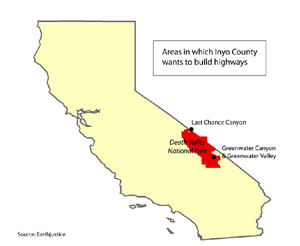One might say Death Valley National Park has been under siege of late from incursions on its landscape.  Back in November a coalition of groups went to court to try to block off-roaders from winching their rigs up Surprise Canyon on the western edge of the park below Panamint City. Now another coalition is working to stop Inyo County, California, from bulldozing roads into designated wilderness on the eastern side of the park.
Back in November a coalition of groups went to court to try to block off-roaders from winching their rigs up Surprise Canyon on the western edge of the park below Panamint City. Now another coalition is working to stop Inyo County, California, from bulldozing roads into designated wilderness on the eastern side of the park.
On Thursday lawyers from Earthjustice, a non-profit environmental law firm, filed intervention papers in U.S. District Court in Fresno, California, with hopes of stopping the roads.
Inyo County last October had filed its own lawsuit, claiming it was within its rights to maintain the rights-of-way for the two stretches of highway that the county contends have been recognized as county highways for decades. Under the county's plan the roads would run through Greenwater Canyon, Greenwater Valley, and Last Chance Canyon. Those areas were designated as wilderness when Death Valley was given national park status in 1994, according to Earthjustice. Today the areas are home to desert tortoise, desert bighorn sheep and other
park wildlife. There are also rock art sites in the areas.
“It’s in the public interest to ensure that the natural
and archaeological treasures in Death Valley National Park are protected. This
is our legacy for future generations,” says Deborah DeMeo, program manager for
the National Parks Conservation Association. “This suit threatens to destroy
one of the park's main attractions - its stark, pristine desert
beauty.”
But Inyo County officials claim they have a legal right to build and maintain the roads.
"Petro Road, Lost Section Road and Last Chance Road are county highways of local historical and cultural significance. These roads were part of a network of roads that enabled prospectors and settlers to explore and establish communities in the eastern section of the county at the beginning of the 20th century," the county claimed in its lawsuit against the Interior Department.
"These roads have existed for generations as a cultural and recreational heritage for the citizens of Inyo County and of the region. The county has a unique and independent responsibility to preserve this heritage into the future."
Working with NPCA to stop the county are the Sierra Club, Friends of the Inyo, California Wilderness Coalition, Center for Biological Diversity, and The Wilderness Society.
“It’s a shame that the Board of
Supervisors has chosen to spend scarce local and national taxpayer money
attacking one of America’s most popular natural icons, especially when there is
so much real need all across our national parks system and on public lands," says Paul McFarland, director of the Friends of Inyo. "Visitors and locals alike need open campgrounds and maintained trails, not
divisive lawsuits.”
Inyo County’s action is the latest
attempt by off-road organizations, counties and states throughout the West to
take over little-used tracks on federal lands on the basis of a Civil War-era
law called R.S. 2477 that was repealed 30 years ago, according to Ted Zukoski, attorney
for Earthjustice.
“Use of this ancient, repealed law threatens
to degrade some of America’s most spectacular lands, from the Arctic Refuge in
Alaska, and Canyonlands National Park and the Grand Staircase-Escalante National
Monument in Utah, to Dinosaur National Monument in Colorado. And now Death
Valley’s natural wonders are under attack,’’ Zukoski says.

 Support Essential Coverage of Essential Places
Support Essential Coverage of Essential Places







Comments
Members of the "kick the bucket club" would like to see some of the beauity and wilderness you seek to protect from all but those able to hike 10-20 miles with full pack.
Ive driven these roads many years and resent that suddenely its time for change. Solitiude and peace are what is saught by visitors to these areas,that means access!!!!!!!!!!!!
You seem to want to put it in a "box". For what?